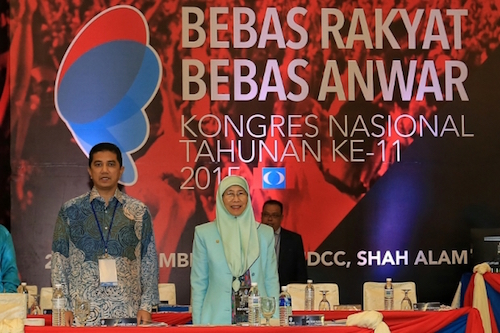Three things we learnt from: the PKR National Congress
Kamles Kumar, Malay Mail Online
For three days, hundreds of PKR members converged on the IDEAL Convention Centre here for the party’s annual national congress.
There, delegates had their say and the party shared its vision for a future without — for the time being, at least — the talisman that is Datuk Seri Anwar Ibrahim.
As the weekend passed, the party’s direction and plans on remaining relevant both as an opposition party and aspirants to power became more apparent.
Here are three things we learnt about the PKR National Congress:
1. An unfortunate fly in PKR’s Sabah, Sarawak ointment
Sabah and Sarawak are key states for both the ruling Barisan Nasional (BN) and opposition parties such as PKR in their individual quests to retain or gain power.
This was clear from the prominence given to issues in both states during the PKR annual assembly.
PKR president Datuk Seri Dr Wan Azizah Wan Ismail at one point promised that the peninsula-based party may in the future hold its annual congress in east Malaysia.
Sabah PKR chief Datuk Lajim Ukin, in his fiery address, also reminded the audience on the importance of capturing the state from BN.
But the plans have run into crisis after PKR vice-president Nurul Izzah Anwar was photographed posing together with Jacel Kiram, the daughter of the Sulu “Sultan” whose forces invaded Lahad Datu in 2013.
Throughout the congress, PKR sought to limit the fallout from the faux pas, alternating between claiming it to be a controversy manufactured by rivals BN and downplaying the issue as a small matter of little consequence to Sabahans.
Politics is about perception and sentiments, and Nurul Izzah’s gaffe will have costs, especially with BN leaders pressing home their advantage.
PKR insist that there was no damage done and that Nurul Izzah has already apologised for what they say was an unintended slight to Sabahans.
But it remains to be seen if the hurt feelings in Sabah are as minor as the party’s leaders from the state claim.
Dr Wan Azizah said it best, however, when she said only time will tell what the actual damage will be.
2. A schizophrenic relationship with PAS
Despite being allies in Pakatan Harapan, PKR and DAP’s concurrent annual meetings conveyed vastly different messages with regards to their choice of Islamist allies.
While DAP repeatedly touted Parti Amanah Nasional, the PAS splinter party, as the catalyst needed to revive the opposition pact’s ambitions to take Putrajaya, PKR made clear that PAS remains vital to any hopes of unseating BN from power.
PKR deputy president Azmin Ali, who came to become Selangor mentri besar with PAS’s support, restated his party’s commitment to co-operating with the Islamist party, saying that PKR will not allow “outside elements” to influence the decision.
Although it was not said, the reference was plainly to allies DAP, which is locked in open hostilities with PAS.
On the sidelines of the congress, PKR secretary-general Rafizi Ramli stressed the importance of PAS in elections, especially when it comes to mobilising support in semi-rural and rural areas.
The arrangement also brings into question the role that Amanah will play in the larger Pakatan Harapan’s plans, and suggests its value to the pact may not be as important as some portray.
The unsaid message to allies appeared to be that while they are now at odds with PAS, it was still better to have the Islamist party as a friend and not a foe, or at least one that’s not outwardly hostile.
3. Anwar is still everything for PKR
For the first time again in many years, Anwar was not present at the PKR congress as he was back in prison, but this did not stop his presence from dominating the entire affair.
The walkway to the main congress hall was lined with booths selling Anwar merchandise, from T-shirts, to keychains, books and even mugs. There was even a fake jail cell as part of the “Free Anwar Campaign” for supporters to take pictures in.
In speeches, Anwar featured repeatedly in the numerous diatribes about his imprisonment, which PKR maintains is unjust and wrongful.
This overwhelming attention demonstrated to outside observers that the party’s interests may not move very far beyond Anwar’s own.
And despite resurrection of the PKR battlecry of “reformasi”, reforms appeared to be in short supply as the party has fallen back on holding up the incarcerated Anwar as a totem for support.
Party president — and Anwar’s wife — Datuk Seri Dr Wan Azizah Wan Ismail spent a notable portion of her closing speech to convey how much she missed the former opposition leader, tearing up as she recounted her last moments with Anwar before he was taken away to Sungai Buloh Prison.
While fighting for Anwar should remain a key objective of the party, it can sometimes appear to be its sole ambition.
This tack may gain some sympathy with the older generation of voters, but is unlikely to win over the younger generation less taken in by Anwar’s cult of personality.


